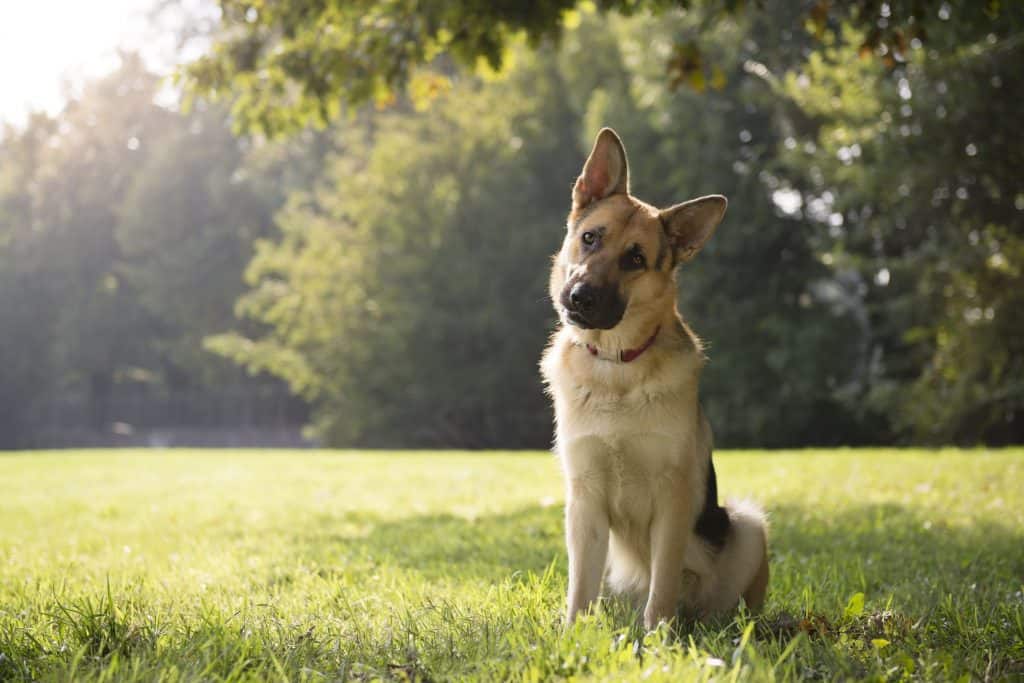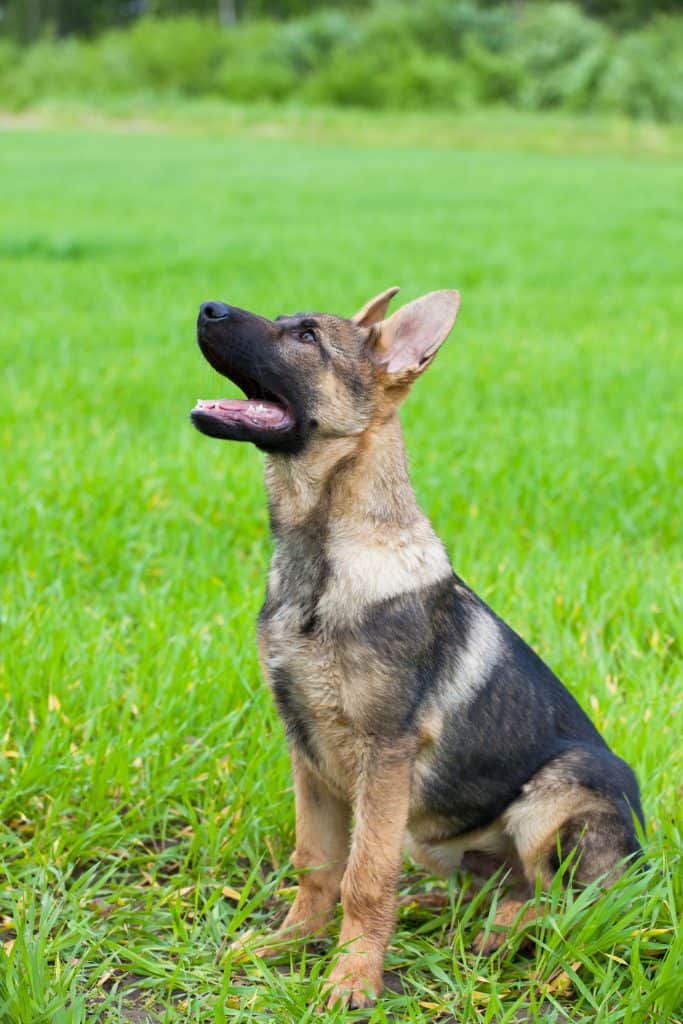German Shepherd Intelligence: How Smart Can You Expect Them to Be?

German shepherds seem like really smart dogs. They listen to their owners well and always seem ready to perform a plethora of cool tricks, but how smart are they really? I was curious, so I did a little research and here is what I found out.
So, how smart can you expect German shepherds to be? German shepherd rank as the third most intelligent dog breed. Discussion on canine intelligence usually centers around obedience intelligence, which is the ability dogs have to learn and follow new commands, an area where the German Shepherd breed excels.
Scientists figure that a dog’s intelligence is about 50% genetics and 50% circumstantial. Just because a dog is of an “intelligent” breed is no guarantee of a genius level IQ. Rather, if you want your dog to reach maximum potential, you will need to push it to learn and grow.
Why Are German Shepherds So Smart?
History
To better understand why German shepherds are so smart, we need to understand their history.
If you haven’t guessed it, German shepherds were originally bred to herd and protect sheep. Their keen sense of smell and an agile mind, make them the perfect sheep herding dog.
Not only were German shepherds bred to herd and organize sheep, but their muscular body and sharp teeth are intimidating forces to anything that threatens the integrity of the flock, both animal and man.
German shepherds are descended from an earlier shepherding dog called the European continental shepherd dog. This dog was large and intelligent, bearing similar traits to the modern German shepherd.
When the continental shepherd landed in Northwestern Europe at the beginning of the 19th century, the natives immediately respected this hard-working animal.
It was employed all throughout the region as a shepherd dog and quickly developed the distinct traits of the nation it was in. From here, the continental shepherd dog developed into the Belgium shepherd, the Dutch shepherd, and, of course, the German shepherd.
The German shepherd was valued above all for its intelligence. It could learn new commands quickly and retained them for years. With the rise of industrialization at the onset of the 20th century, predator populations fell sharply in the country and the German shepherd’s sheep herding skills were needed less and less. However, that doesn’t mean people forgot the breed.
Max Von Stephanitz was born into German nobility Dec 30, 1864. He served as cavalry captain for most of his life and studied animals at the college of Berlin. He admired the German shepherd for its intelligence and loyalty, but couldn’t find a dog that met the standards for what he imagined to be the “perfect working dog”.
Finally, after years of searching, Von Stephanitz found his perfect dog and quickly began breeding. From the offspring of this first German shepherd are descended all modern German shepherds.
Thanks to the efforts of Max Von Stephanitz the German Shepherd was born, and he is credited for the creation of the breed today.
The German Shepherd Today
Today, thanks to the breeding efforts of Mr. Von Stephanitz, the German shepherd enjoys a certain level of notoriety as on of the most intelligent dogs.
Police and military outfits around the world employ German shepherds almost exclusively in special ops missions and field work.
Although the border collie and poodle may be ranked as “more intelligent”, I doubt you will ever see a poodle participate in a police drug bust. For this reason, German shepherds are often considered by many experts today to be the most intelligent dog.
Judging a Dog’s Intelligence
Let me start off by saying that ranking a dog’s intelligence is somewhat subjective. Just like with people, some dogs are better suited to some tasks than others.
Compare a famous artist with a famous physicist. If you asked the artist to make a rocket, he would probably just scratch his head. Ask the physicist to paint a masterpiece and you get a portrait that only a mother would hang on her fridge.
The same can be said for dogs.
In 1994, Dr. Stanley Coren, neuropsychologist and Professor Emeritus in the Department of Psychology at the University of British Columbia, published his landmark piece The Intelligence of Dogs which changed our understanding of how dogs think and act.
In his book, Dr. Coren ranks over 100 breeds of dog in order of intelligence. He judged the dogs by the following criteria:
- Instinctive intelligence (or the ability a dog has for completing the task for which it was originally bred).
- Adaptive intelligence (a dog’s ability to solve problems without any instruction).
- Working and Obedience intelligence (a dog’s ability to learn and follow commands given by humans).
Dr. Coren presented hundreds of puzzles to hundreds of different dogs and judged which breeds could best solve the puzzles.
The German shepherd excelled at these tasks due to its intrinsic intelligence and eagerness to please.
What Does it Mean for a Dog to be “Intelligent”?
Dr. Coren was ranking by “obedience intelligence” or the ability a dog has to learn and follow commands. In fact, it is this area of intelligence that is still most heavily discussed today.
German shepherds have a unique ability to follow human commands very well, but that doesn’t mean they outstrip every other dog in every task.
Although a German shepherd could learn to pull a sled and work in a mush team, that doesn’t mean he could do it better than a Siberian husky.
Just because a German shepherd has a keen sense of smell doesn’t make him a better tracker than a blood hound.
The point I’m getting at is, Dr. Coren’s research, while fascinating and useful, is the final word on dog intelligence.
Don’t get me wrong, the German shepherd is a very intelligent and useful dog, but that doesn’t make him the unopposed heavy weight champion of dog intelligence.
How Smart Can You Expect Your German Shepherd to Be?

German Shepherds are a bright breed. They follow orders well and have a fair amount of autonomy when it comes to figuring things out on their own, but what does that mean for you the owner?
Intelligent, not Psychic
I know a lot of first time German shepherd owners that are frustrated with their dogs when they first bring them home.
“I just don’t understand it.” They say, shaking their heads slowly as they thrust their hands into the deep pockets of their blue jeans.
“I thought these dogs were supposed to be smart or something, but every time I tell Mr. DoggyFace to sit, he just stands there and looks at me with those big ol’ eyes. What am I doing wrong?”
German shepherds are smart, but they aren’t psychic. Don’t hold your dog to unreasonable standards that you wouldn’t hold another human too. You wouldn’t expect a child to know how to mow the lawn without first showing him how to do it, and you shouldn’t expect a dog to follow commands without first showing him the ropes.
Training a German Shepherd
Maybe one of the reasons German shepherds are so easy to train, is because they are eager to please their human owners.
German shepherds go bonkers over human praise and belly rubs and will do just about anything to be recognized.
Let’s go over what it may be like the first day you bring home a brand new German shepherd puppy and how intelligent you can expect it to be.
The First Day
You have been wanting a dog for a while now and have finally decided on purchasing a German shepherd. You did your research and found out that German shepherds are loyal and loving. A great family dog. Active and energetic. Perfect for your crazy kids who are always bouncing off the walls.
What attracted you most to this breed was how everyone seemed to rave about how smart and easy to handle it was. You hope all that praise was warranted as you step through your front door, set the kennel down, and open the door.
The first day you bring your German shepherd puppy home will be both exciting and painful. Exciting because of your new furry addition to the family, and painful once you realize how much of a handful a new pup can be.
German shepherd puppies can be as rambunctious and loud as any human child. It is important that on the first day you don’t expect perfect obedience.
Do your best to quickly establish a routine that your new puppy will follow as a new member of the family. Routine not only helps a dog feel comfortable and at ease, but structure also preps a dog for obedience training that will happen promptly.
You can start by introducing your GSD (a common abbreviation meaning “German Shepherd Dog”) puppy to his “space”.
A dog’s space is where he eats and sleeps, and, most importantly, uses the bathroom. These places don’t necessarily have to be in the same room, but he should become acquainted with each space.
Watch for signs that your dog needs to eliminate (sniffing, pacing, and of course the tell-tale hind leg in the air) and quickly usher him to the bathroom area.
Utter loudly and clearly the command “private time” or “use the bathroom” or something like that. Once finished eliminating in the correct place, lavish your puppy with praise. If you begin associating your commands with using the bathroom, it will make house-breaking later on much easier.
The most important thing to remember is that all of this will be new to your puppy the first day. Don’t expect anything from your pup that you wouldn’t expect from a nervous toddler.
Be calm and make sure you give your new fuzzy buddy sufficient space. You don’t want to overwhelm the little guy his first day in his new home.
Continuing Training

As your dog continues to learn and grow, it is important that you follow a strict routine. A schedule is a great way to manage your dog and help him adjust to his new life.
Here is a dummy schedule that may be helpful. Follow it exactly or change it depending on your individual needs.
| 7:00 – 7:30 AM | Take your dog for a walk and let him do his business. |
| 8:00 AM | Give your dog his breakfast. |
| 9:00 AM | You go to work. Leave your dog outside for fun and private time. Make sure you leave him something for lunch. |
| 5:00 PM | Come home. Feed your dog dinner. |
| 6:00 – 6:30 PM | Take your dog for a walk. |
| 7:00 – 8:00 PM | Playtime! Fetch, a sunny stroll through the park, tug-of-war are all good options. Let your dog eliminate. |
| 8:30 PM | Bath and prepare for bed. |
| 9:00 PM | Bedtime. |
It’s important to train be training your dog at all times. When you take your dog out for a walk and when you play with him are the best opportunities to train.
German shepherds specialize in learning commands quickly and efficiently. Teach your dog to come, sit, stay, and heel before anything else.
Training Tips
Training any dog can be difficult, here are a few pro tips that might help you out:
- Alternate your rewards. Praise, games, and a variety of treats are all great options. Dogs respond well to novelty. A new treat for doing something well every now and then is a great way to keep things interesting. Your dog will work harder if it thinks something new might be coming.
- Don’t acknowledge negative behavior (no matter how cute it is). A lot of amateur dog trainers have this problem. They will command their dog to do something, who then promptly does the opposite, but it’s so cute that the trainer rewards them anyway. This can really screw things up. Resist the temptation. Don’t give your dog any praise for negative behavior.
- Ignoring your dog usually works better than anger. It can be hard not to shout at your dog when he does something naughty, but yelling might not always be the right thing. Sometimes a sharp “No” is necessary, but constant shouting and finger-wagging might actually get your dog more excited.
- Persistence and routine are key. Nothing will get your dog trained faster than consistency. Always reward your dog when he behaves well and always withhold attention when they misbehave. It sounds simple in theory, but it can be difficult to practice. Trust me, your dog will be trained 10 times faster if you stick to a training schedule.
Related Questions:
Are German Shepherds good family dogs? German shepherds are eager to please and behave well around children old enough to know the difference between a dog and a toy. They are an excellent family dog. Famously obedient and they are loving and loyal to their owners.
What is the most intelligent dog breed? According to older studies, border collies are the most intelligent dogs. However, experts have recently called the German shepherd the most intelligent dog. German shepherds are employed as service animals in just about every field far more often than border collies. They are smart, agile, and with amazing reflexes and a keen sense of smell to boot.

